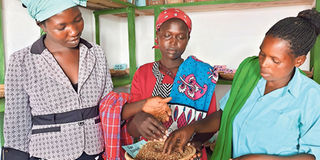Lender where grains are currency

Some of the members of the Friends of Katuku Odeyo Farmers Group display seeds they have at their Nyando Community Seed Bank. There are approximately 100 sorghum, 100 finger millet and 80 bean seed varieties collected from Kenya, Uganda and Tanzania inside the bank. PHOTO | RACHEL KIBUI | NMG
What you need to know:
- The bank, a brick-walled structure named Nyando Community Seed Bank, hosts neatly woven traditional bowls filled with mainly millet and sorghum seeds.
- During the tour, farmers learnt how their Ugandan counterparts had successfully conserved indigenous seeds.
- Ouko observes the indigenous seed varieties have been dwindling fast amid the challenges of climate change, which have negatively affected viability of several hybrid varieties.
- Over the years, hybrid seeds have been replacing the traditional varieties as the former are seen as superior. However, this is not necessarily the case, according to seed experts.
A drive on the Kisumu-Sondu highway is refreshing, thanks to the undulating landscape.
Our destination is Jimo East village in Nyando, some 25 kilometres from the Kisumu-Kericho highway, where we find a group of farmers, some from Uganda and Tanzania, sitting under tents ready to launch the first seed bank in the region.
The bank, a brick-walled structure named Nyando Community Seed Bank, hosts neatly woven traditional bowls filled with mainly millet and sorghum seeds.
Some are labelled ‘GBK’, which stands for Gene Bank of Kenya while others bear Tanzanian and Ugandan names.
There are approximately 100 sorghum, 100 finger millet and 80 bean seed varieties collected from Kenya, Uganda and Tanzania inside the bank.
The seeds belong to the 400 members of Friends of Katuku Odeyo Farmers Group. “We conceived the idea of a seed bank last year after some of our members went for an exchange visit in Uganda,” says Eddy Ouko, the group’s chairperson, adding the visit was facilitated by Kenya Agriculture and Livestock Research Organisation (Kalro) and Bioversity International, an NGO.
During the tour, farmers learnt how their Ugandan counterparts had successfully conserved indigenous seeds.
Back home, they established the bank and Kalro released the indigenous seeds to the farmers for banking and further multiplication.
Ouko observes the indigenous seed varieties have been dwindling fast amid the challenges of climate change, which have negatively affected viability of several hybrid varieties.
Now with the seed bank, they expect not only to conserve the indigenous seeds, but also save costs.
“We have already given the first group of 100 farmers a seed ‘loan’ of 500 grammes of various seed varieties from which they are expected to return not less than 4kg to the seed bank. After paying the first loan, farmers will get higher amount of seeds in the second loan,” says Ouko.
The seeds are treated with a mixture of wood ash and moringa powder for longer storage. The store is also well ventilated to allow air circulation.
BOOSTING FOOD SECURITY
Besides, they keep the area that surrounds the store clean by cutting off shrubs, which can be breeding places for rodents such as rats and other pests.
“With seed savings, the trick in getting a good harvest lies in seed selection, which involves marking the crops that germinate fast. In the past, farmers have exchanged seeds for years and the nation was more food secure,” says Ouko. The concept has seen the number of farmers seeking to join the group rise. The group is currently targeting at issuing seed loans to all the 400 members, who have shown interest.

Nyando Community Seed Bank, which is run by the Friends of Katuku Odeyo Farmers Group. With the seed bank, the farmers expect not only to conserve the indigenous seeds, but also to save costs. PHOTO | RACHEL KIBUI | NMG
Peris Anyango, a small-scale farmer and a member of Friends of Katuku Odeyo, says she looks forward to her next loan.
She is confident that she will get the seed loan as she has harvested slightly more than 4kg of the sorghum seeds that were loaned to her.
“I had been loaned three varieties of sorghum, but will narrow down to two, as one did not perform well,” says she.
Anyango, like other farmers, believes that the seed-saving concept will relieve her the burden of having to buy seeds every planting season.
A half-kilo of seeds, she says, costs Sh500, which she finds high, especially considering that sometimes the crop fails during prolonged dry seasons.
Over the years, hybrid seeds have been replacing the traditional varieties as the former are seen as superior. However, this is not necessarily the case, according to seed experts.
Hivos East Africa regional director Mendi Njonjo says reliance on hybrid seeds is costing farmers the seed-saving culture and the country its seeds sovereignty.
Mendi says most hybrid seeds require a lot of highly mechanised systems, which are not affordable to most farmers.
According to her, traditional seeds would be a great solution to boosting food security, not necessarily because they produce well, but because they are sustainable.





